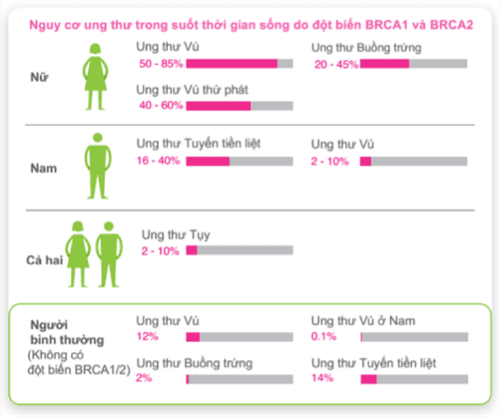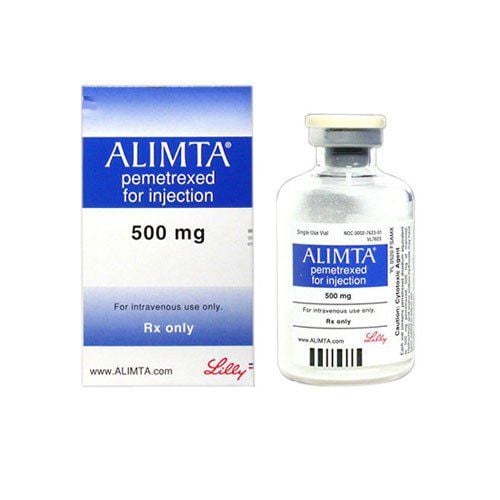This is an automatically translated article.
Breast cancer is a common disease in women, but can also occur in men. If a person carries a mutated BRCA1 or BRCA2 gene, this person has a higher risk of developing breast cancer than other people. So what is the role of the BRCA gene in men and women?
1. The role of the BRCA gene in men and women
Both men and women carry the BRCA gene including the BRCA1 and BRCA2 genes, which play a role in protecting the body from breast and ovarian cancer in women, as well as breast and prostate cancer in men gender.
When the BRCA genes are mutated, there is an increased risk of breast cancer, ovarian cancer or prostate cancer. Mutations in the BRCA gene not only increase the risk of these cancers, but they also affect a number of other cancers. Other cancers affected by mutations in the BRCA gene include: Fallopian tube cancer Peritoneal cancer Pancreatic cancer For women who carry a mutated BRCA1 or BRCA2 gene, there is an increased risk of developing it Lifetime breast cancer is 60-90% with BRCA1 mutations and 45-85% for BRCA2 mutations.
The BRCA1 and BRCA2 genes are also responsible for 85-90% of hereditary ovarian cancers.
Both BRCA genes are considered high risk factors for the development of cancer, so people need to understand about hereditary cancers and get genetic testing to see their level of risk. is how much.
If a woman tests positive for BRCA1 or BRCA2, your risk of breast and ovarian cancer is much higher than in the general population. If a man tests positive for BRCA1 or BRCA2, he has a higher risk of developing breast cancer than other men. In addition, men with mutations in the BRCA gene are more likely to develop prostate cancer.
However, testing positive does not mean you will definitely get these cancers.

Cả nam giới và phụ nữ đều mang gen BRCA bao gồm gen BRCA1 và BRCA2 có vai trò bảo vệ cơ thể khỏi ung thư
2. Is the BRCA gene mutation inherited?
You can inherit the BRCA gene mutation and other mutations from your mother or father. Your family health history is very important, this information will help assess your risk of disease.
A woman inheriting a BRCA gene mutation from her mother or father increases her risk of breast and/or ovarian cancer. A man who inherits a BRCA gene mutation (especially a BRCA2 gene mutation) from one of his parents has an increased risk of breast and prostate cancer.
Therefore, it is very necessary to detect a person carrying a mutated gene so that it can be promptly treated and taken effective preventive measures. However, we cannot assign testing for BRCA1 and BRCA2 gene mutations to everyone but only those who have a close relative with one of the following diseases:
Breast cancer, especially at a young age under 50 years old. Ovarian cancer, peritoneal cancer or fallopian tube cancer. Triple negative breast cancer: A type of breast cancer that lacks estrogen receptors, progesterone receptors, and HER2 receptors. Cancer in both breasts. Breast cancer in men Pancreatic cancer Metastatic prostate cancer Many people have cancer in their families including breast cancer, ovarian cancer, prostate cancer or pancreatic cancer. In the family, someone carries a mutation in the BRCA1 or BRCA2 gene. If you test positive for BRCA1 or BRCA2, your risk of breast and ovarian cancer is much higher than in the general population. But this does not mean that you will get these cancers, because many other factors affect the development of cancer.
Your lifestyle and environmental factors play an important role in determining whether you will develop cancer. It's important to note that if diagnosed at an early stage, women with breast or ovarian cancer can have a positive outcome, even for patients who carry mutations in the BRCA1 or BRCA2 genes. .

Việc phát hiện ra một người mang gen đột biến để có thể xử trí kịp thời và đưa ra các biện pháp dự phòng hiệu quả là rất cần thiết
To reduce your risk of developing cancer, you should have a healthy diet and lifestyle, exercise regularly and reduce alcohol consumption and stop smoking.
Age-appropriate cancer screening is very important. Women should have an annual breast exam from age 40 until age 49, then every two years for women age 50 and older. Young women should do regular breast self-exams every month from the age of 20 at one week after the end of menstruation when the breasts are less engorged and lumpy to see if there are any changes in the breast. Men should begin breast cancer screening at age 35 and prostate cancer screening at age 45.
Currently, we do not have a single reliable screening test to diagnose ovarian cancer. Often, a blood test to check for CA125 which is a common marker for ovarian cancer can be done along with an adnexal ultrasound. However, ovarian cancer is often diagnosed at surgery. That's why it's so important to get to know your body and be aware of any changes or symptoms. If you find something abnormal in your body that you are not sure about, see a doctor to be checked by a specialist to see if the changes are dangerous.
Early cancer screening is considered a perfect measure in the timely detection and treatment of all types of cancer. Reduce the cost of treatment and especially reduce the mortality rate in patients. Vinmec International General Hospital always deploys and introduces to customers Early cancer screening at Vinmec - Peace of mind to live well to help with gene testing, imaging diagnostics, testing of biological markers to detect tumors Soon. Vinmec International General Hospital has many packages of early cancer screening.
Only one gene test can assess the risk of 16 common cancers in both men and women (lung cancer, colorectal cancer, breast cancer, pancreatic cancer, neck cancer) uterus, stomach cancer, prostate cancer,....) Early detection of early signs of cancer through imaging, endoscopy and ultrasound. The operation is simple, careful and accurate. A team of well-trained specialists, especially in oncology, are capable of handling cancer cases. With facilities, advanced and modern medical equipment and a team of doctors with deep expertise and experience. At Vinmec, the examination process becomes fast with accurate results, saving costs and time for patients.
Please dial HOTLINE for more information or register for an appointment HERE. Download MyVinmec app to make appointments faster and to manage your bookings easily.
References: iconcancercentre.s
MORE:
What do BRCA gene test results say about breast cancer risk? Breast cancer and your genes Mutations in the BRCA1 and BRCA2 genes - the leading risk factor for breast cancer













